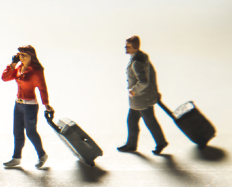WHY DO PEOPLE TRAVEL?
People travel for many different reasons. They make journeys to and from school or work every day; they visit friends and family, they go to shopping or football matches, they go out for evening entertainment such as the cinema or theatre and they go away on business or study trips. So when does travel become tourism? When people travel to and stay in a place which is not where they live, it is called ‘tourism’. There are also many types of tourism. For example, there is recreational tourism if you want to relax and have fun, such as swimming or sunbathing at the beach. With cultural tourism, you can go sightseeing or visit museums to learn about history, art and people’s lifestyles. There’s adventure tourism that you explore places far away or you try extreme activities. Ecotourism is about ethical and responsible trips to natural environments such as rainforests. Winter tourism is usually holidays in resorts where there is snow and people go skiing or snowboarding. Sport tourism is to play or watch different sporting events like the Olympics. Educational tourism is to learn something, possibly a foreign language, abroad. Nowadays there is also health tourism to look after your body and mind by visiting places like spa resorts; religious tourism is to celebrate religious events or visit important religious places such as Mecca for Muslims; and gap-year tourism when young people go backpacking or do voluntary work between school and university.

